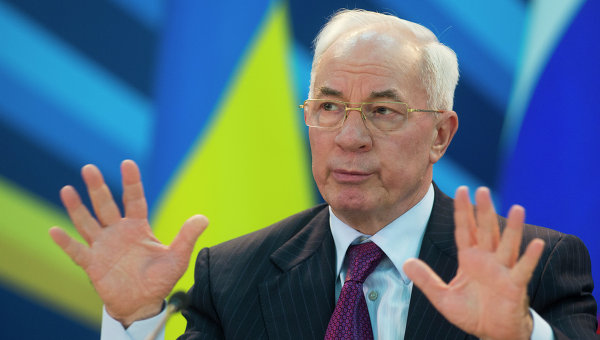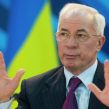
Ukraine: The Unaddressed Issues Facing the Protest Leaders
Publication: Eurasia Daily Monitor Volume: 11 Issue: 17
By:

On January 28, Prime Minister Mykola Azarov submitted his resignation to President Viktor Yanukovych, while an extraordinary session of the parliament (Vekhovna Rada) repealed the “draconian laws of January 16,” which had triggered the outburst of radicalism, violent battles, and tense standoffs between protesters and the police on Hrushevskoho Street in Kyiv (Kyiv Post, January 28). Yet, several urgent and no less important issues remain unaddressed: governance reform and the Russian influence on Ukrainian politics.
On January 25, President Yanukovych and administration officials met with opposition leaders and formulated a set of proposals and agreements. These included the president’s offer to name Fatherland Party leader Arseniy Yatseniuk prime minister and for UDAR (Punch) party head Vitaliy Klichko to be nominated deputy prime minister for humanitarian affairs (UNIAN, January 25). At the subsequent January 28 meeting, however, both opposition leaders rejected President Yanukovych’s offer, although Mykola Azarov did resign from the prime minister post (UNIAN, January 28)—a possible sign of an interim “under-the-table” agreement.
Had the authorities acquiesced to the Maidan protesters’ biggest demands—Viktor Yanukovych’s resignation and early Rada elections—this might have been sufficient to calm the demonstrations temporarily. But such actions would also have brought to the forefront some of Ukraine’s unresolved political issues. One such priority area is governance reform. Notably, Ukraine’s policymaking is considerably dependent on the country’s oligarchs. According to reports, a special meeting of the country’s most powerful oligarchs, including Rinat Akhmetov and Dmytro Firtash, may have taken place on January 25 to address the political crisis (https://www.theinsider.com.ua/politics/52e3c95cb2393/). Presently, there are indications that some oligarchs “diversify” their political investments by providing some support to protesters, such as positive coverage in the media outlets that they own. Yet they are also apparently willing to maintain the political system’s status quo by continuing to back the authorities in power.
Another unresolved political issue has become the decay of regional governance. The week of January 21 resulted in countrywide protests targeting Ukraine’s regional (oblast) administrations headed by governors essential to the president’s “power hierarchy.” Some of these demonstrations were organized by soccer fan groups, and not by the opposition leaders. Ten oblast administrations were seized as of January 28 (https://tyzhden.ua/Infographics/99884). Local government building seizures in Chernivtsi, Rivne and Ivano-Frankivsk oblasts were carried out unexpectedly smoothly, while in Cherkasy and Zaporizhzhia police harshly dispersed the protesters. These regional protests may open the way in some oblasts to the replacement of governors, which is likely to be accompanied by bargaining among various power groups. For now, however, the opposition parties and Maidan activists have not publicly addressed the issue of governance in the regions, focusing instead on the central government.
The escalation of clashes between the authorities and protesters also highlights the necessity to reform the country’s law enforcement and security sectors. In many cases, the police responded with unjustified use of violence, abuse of detained protesters and attacks of journalists—60 journalists have reportedly come under police attacks during the period of January 19–27 (https://www.unian.ua/politics/877502-jurnalisti-mayut-buti-gotovi-do-togo-scho-mojut-zaginuti-pid-chas-boyovih-diy-bondarenko.html). Coupled with this has been the widely reported use of violent civilian “titushki” helpers by the police (see EDM, January 22). Some observers have blamed law enforcement’s excessive reactions on poor service conditions inside the units, while some point to a systemic police culture of over-reliance on force, as well as corruption (https://texty.org.ua/pg/article/editorial/read/51300/Spovid_milicionera_u_bagatoh_pidrozdilah_narada_pochynajetsa). Ukraine’s police officers number some 350,000, overwhelmingly exceeding Armed Forces personnel (approximately 140,000). Therefore, without deep and comprehensive reform, the opposition’s demands to abolish the Berkut riot police would simply result in increased mobility within the wide-ranging, corrupt and inefficient law enforcement system.
In addition to raising the above-cited domestic issues, the ongoing political crisis in Ukraine has also highlighted Russia’s overwhelming influence on the situation in the country. First and foremost is the issue of Russian financing and reduced natural gas price. Even if the opposition were in power in Ukraine, it is far from certain that it would have been able to secure a loan from the International Monetary Fund (IMF) in place of Russian financial assistance, or that it would have successfully built societal consensus in support of the painful gas and utilities tariffs reforms and social spending cuts the IMF required. Speaking to Vedomosti, Fatherland Party representative Yuriy Odarchenko seemed content with the Russian financing: “Russian loans were granted on a commercial basis; Ukraine is able to meet all terms and will meet them.” After having dispersed the first of the funds, Moscow’s position on continuing its assistance to Ukraine is not static, however; a Russian federal-level official told the same paper that any escalation in the political crisis could force the Russian government to rethink its support to the Ukrainian government (https://www.vedomosti.ru/politics/news/21715421/kredit-ukraine-zavisit-ot-katapulty#ixzz2rbziv3DP).
Furthermore, Moscow is likely to influence Ukrainian policy by defending its own agenda in meetings with European Union officials. During the January 28 Russia-EU Summit in Brussels, President Vladimir Putin stated that the solvency and structural reforms of the Ukrainian economy are a “principal issue” for Russia—Ukraine must be able to pay back the Russian debt (RBC TV, January 28). Nevertheless, on January 23, Gazprom revealed that Ukraine’s debt for last year’s gas supplies totaled $2.7 billion, and set a deadline for repayment for January 25, thus exposing Ukraine’s poor financial situation (RIA Novosti, January 23).
On January 24, Putin’s assistant, Yuriy Ushakov, insisted that Russia “emphasized non-interventionism” toward the domestic situation in Ukraine. Yet he added, “But this does not mean that we do not have contacts with various representatives, including the most high-standing ones” (Interfax, January 24). On the same day, President Putin discussed the situation in Ukraine at a meeting of the Russian Security Council (Interfax, January 24). Indeed, the perception of Russia’s deep involvement in Ukraine’s domestic affairs was underscored this week by apparently fake news of Moscow deploying Russian special forces to the Ukrainian city of Mykolaiv, along the Black Sea (https://www.youtube.com/watch?v=IyZQ2G51e9w).
To date, none of the Ukrainian opposition parties has presented a clear strategy for how to deal with Russia’s growing influence over domestic politics. But it is clear that, alongside governance reform, this explosive issue is likely to become one of key factors that will be discussed in the next election campaign.




